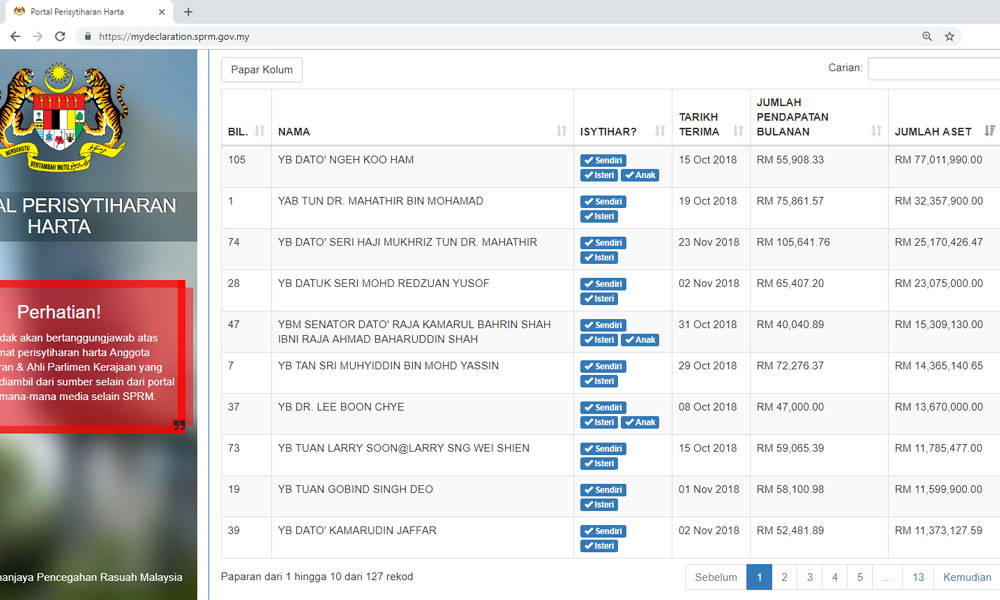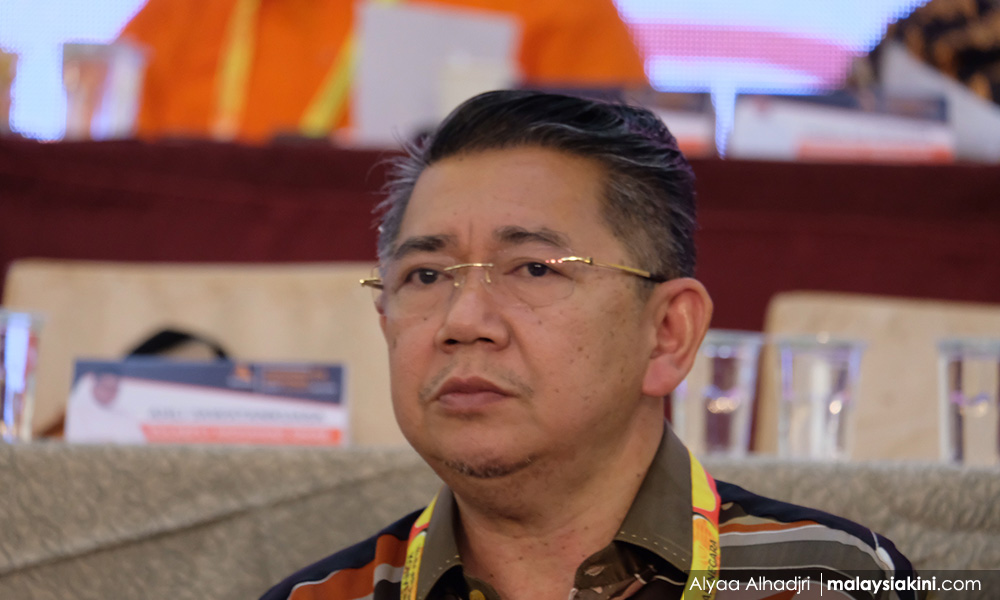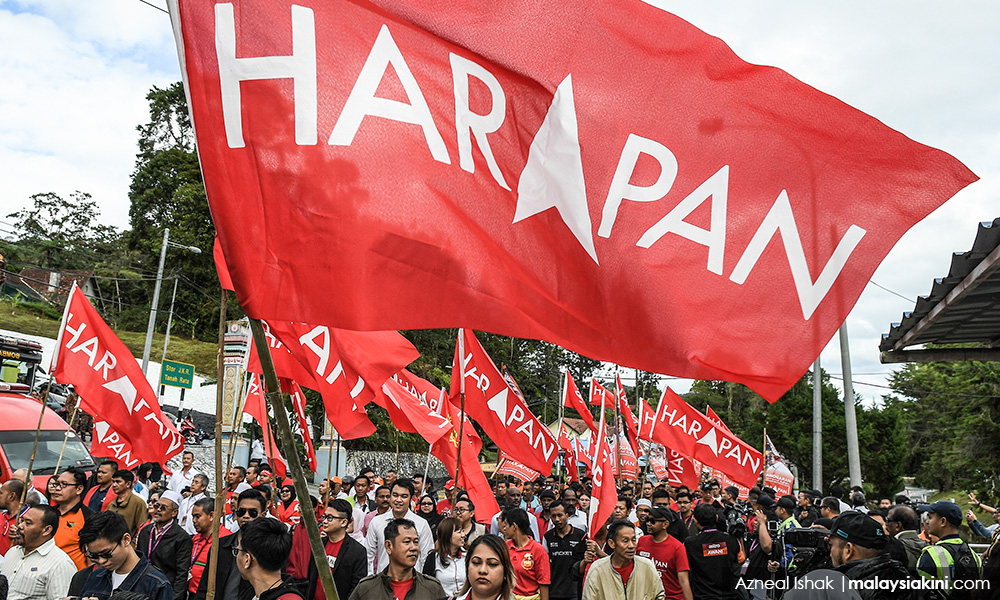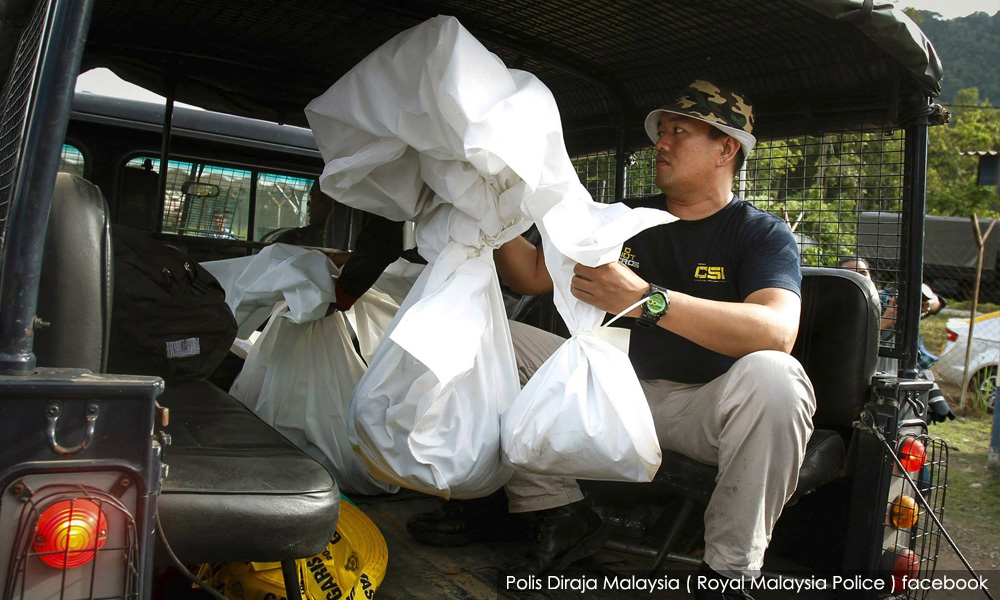COMMENT | Today marks the one year anniversary of the National Anti-Corruption Plan 2019 – 2023 (NACP), a clear five-year roadmap to combat corruption.
In spite of Malaysia’s marked improvement in the Transparency International’s Corruption Perception Index (CPI) 2019, there is still much to be done by the government to combat structural corruption and transform its commitments towards transparency and accountability.
Notwithstanding the fact that anti-corruption efforts taken were prioritised since the change of federal government, the results of the Tanjung Piai and Kimanis by-elections clearly show us that the government has yet to deliver the major reforms as expected or hoped by the public.
The government must take the fight against corruption seriously or risk being a one-term government. On Jan 7, 2020, the prime minister announced:
“As at Dec 31 last year, 22 out of 115 initiatives in the plan have been implemented, including asset declaration by members of the administration, while 93 other initiatives are in progress [...]”
The PM’s speech left little to be desired. We, the public, do not know which are the successful 22 initiatives purported to have been realised and what positive impact does the statement seek to achieve besides announcing the factual count to the public? A far more detailed reporting is required after every JKKMAR (Special Cabinet Committee on Anti-Corruption) meeting, to keep with the commitment of a transparent and open government.
The NACP, with the aim of making Malaysia a corrupt-free nation by 2023, has 115 initiatives. An assessment of some of the key initiatives are as follow:
Asset declaration
On July 1, 2019, the Dewan Rakyat approved a special motion requiring all members of Parliament, senators and their immediate family members to declare their assets. This motion which was subsequently incorporated into the "Code of Ethics for Administrative Members and Members of Parliament" mandates that their declaration of assets be submitted to the Dewan Rakyat speaker and the Malaysian Anti-Corruption Commission (MACC) chief commissioner. The Dewan Negara followed in the footsteps of the Dewan Rakyat where a motion requiring all senators to declare their assets was approved on July 22, 2019.

However, as at Dec 5, 2019, only 160 out of the 222 members of Parliament (MPs) have declared their assets to the MACC. The remaining MPs who have yet to declare their assets are riling up more and more unsubstantiated reasons, openly resisting the requirement to do so.
While the Standing Orders are a good first requirement spearheaded by the government, the absence of a legal requirement has made the entire political reform a mockery.
No-gift policy
On June 2018, the PM stated that ministers would no longer be able to accept gifts under a new no-gift policy and this would be applicable to their political secretaries as well.
However, a somewhat startling media report on the arrest of the agriculture and agro-based industry minister’s political secretary begs the question of how effective this new no-gift policy is. The political secretary was arrested on April 1, 2019, for allegedly receiving a luxury watch as a gift from a developer in return for his assistance in securing contracts from the ministry for the developer.
Political funding
Transparency around political financing is the key to addressing and eradicating the deeply entrenched culture of money politics which could lead to corruption and abuse of power. Unfortunately, the government has postponed tabling the bill on political financing indefinitely providing no explanation for doing so. Meanwhile, the statement made by Bersatu’s vice-president Abdul Rashid Abdul Rahman urging the government to give all development projects to the party to run its activities is proof that the culture of money politics is very much alive.
Ban on political support letters
On June 20, 2018, the cabinet decided that all ministers and their deputies will no longer be allowed to issue letters of support for any tenders or proposals submitted to the government to ensure transparency and good governance within the administration.

Ironically, on Nov 22, 2019, it was reported that Agriculture and Agro-based Industry Minister admitted that he had written a letter to the PM requesting that a RM1.4 billion paddy subsidy contract be awarded to the National Farmers’ Association. He defended his action by saying that he did nothing wrong as the Ministry of Finance had yet to decide on the matter. The PM also said on the same day that cabinet ministers are allowed to award contracts that are within their respective jurisdictions.
Ban on political appointments
On Feb 1, 2019, the deputy PM conceded that some of the appointments in government agencies were people who were members of Pakatan Harapan parties or their political associates. However, the deputy PM had rebuffed criticism of cronyism levelled at the ruling coalition, claiming those appointed were chosen based on their qualification.
Harapan’s coalition parties have appointed their party members to positions in various government agencies namely - Wain Saiful Wan Jan (Bersatu) as Perbadanan Tabung Pendidikan Tinggi Nasional (PTPTN) chairperson; Faiz Fadzil (Amanah), who is the Permatang Pasir assemblyperson as the chairperson of Lembaga Kemajuan Ikan Malaysia; Mazlan Aliman (Amanah) as the chairperson of Lembaga Pertubuhan Peladang; Tan Kok Wai (DAP) who is the member of Parliament for Cheras, as the special envoy to China and Tian Chua (PKR), who is vice-president of PKR, as the special adviser for Minister of Works Baru Bian.
This clearly goes against the new government’s purported commitment to refrain politicians from interfering in the appointment of positions in the government.

Back in June 2019, the unilateral decision by the PM to appoint Latheefa Koya as the new chief commissioner of the MACC had discontented many who were opposed to the manner of her appointment. Dr Mahathir Mohamad has claimed, as the PM, he and he alone has the sole prerogative to appoint the MACC chief.
This is definitely in nonconformity with Harapan’s election promise which is to limit the PM’s power in appointing key positions in all independent and statutory bodies as well as to ensure transparency and independence of the chief commissioner from the influence of any quarter.
On Jan 7, 2020, the PM announced that the JKKMAR had agreed in principle to review the appointment and termination process of the MACC chief commissioner. We hope that this goes beyond “lip service”.
Public procurement
Public procurement is one of the government areas most vulnerable to corruption and other illegal activities. Despite existing procurement procedures, various circulars and directives, numerous projects were awarded through direct negotiations and selective tenders in the past, partly due to political interference.
On July 18, 2019, the PM announced that the JKKMAR was discussing the scope of the Government Procurement Bill which would be subsequently drafted by the Ministry of Finance. The procurement legislation that the government plans to have by 2023 will produce the best value for taxpayer’s money. However, to date, the Ministry of Finance’s silence on drafting an important piece of legislation is rather perturbing.
Meanwhile, those who are in positions of power are still continuing with the "business as usual" approach. This can be seen from a recent drug-fueled party which involved public officials to secure large government contracts. On Jan 17, 2020, 17 people were arrested after authorities raided a drug-fueled party and among those present were Dengkil assemblyperson Adhif Syan Abdullah, the assemblyman’s personal aide, special officers to the Home Affairs minister and Youth and Sports minister, an assistant of the PM’s political secretary as well as an officer from the Subang Golf Course council.
Wang Kelian RCI
In May 2015, the authorities discovered 139 graves and 106 bodies deep in the jungles, a few hundred metres from the Malaysia-Thai border in Wang Kelian after receiving information that the location was used as a transit camp to traffic humans. A few months after the mass graves were discovered, the media reported that corrupt high-ranking officials, likely with ties to the trafficking syndicates, had tried to cover up the incident.

As part of the ruling coalition’s commitment to reform, the government had set up a Royal Commission of Inquiry (RCI) in January 2019 to allow the authorities to investigate the tragedy thoroughly. Recently, the Home Minister had announced that the final report of the RCI would be tabled to the cabinet.
In nearly every report on human trafficking worldwide, there has always been evidence of collusion between human traffickers and corrupt public officials – namely security operatives who gain to profit from human misery. Thus, the report and its recommendations must be made public and the corrupt officials involved in it should be brought to justice without fear or favour.
Recommendations:
The JKKMAR has convened for a total of 11 times since its conception and yet it has not been forthright when it comes to the efforts and achievements of the government.
Hence, we would recommend the following:-
(a) The JKKMAR must be given more power to monitor and call out those that delay or ignore the implementation of the NCAP;
(b) Ministers within the JKKMAR must have a designated role to work on a specific agenda envisioned;
(c) Press statements issued by JKKMAR should have more nuance on the efforts made;
(d) JKKMAR must seek for high public participation to generate more accountable feedback from the ground; and
(e) JKKMAR needs to engage stakeholders, including civil society, in order to push the agenda forward.
The above should be taken into serious consideration especially when the government has already realised that it takes more than one term to fix, deliver and transform the nation's governance for the better.
FADIAH NADWA FIKRI and LALITHA KUNARATNAM are operations manager and senior researcher respectively at C4 Centre, the anti-corruption watchdog NGO.
The views expressed here are those of the author/contributor and do not necessarily represent the views of Malaysiakini.

